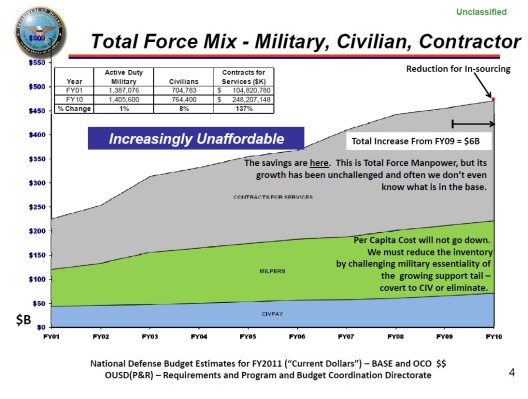President Obama didn’t mention them. Nor did Defense Secretary Leon Panetta. No word on them by the Chairman of the Joint Chiefs of Staff Martin Dempsey either. Deputy Secretary of Defense Ash Carter? Didn’t happen. Under Secretary of Defense Michèle Flournoy? Vice Chairman of the Joint Chiefs James Winnefeld? Nope. Nada.
Who wasn’t mentioned at today’s big press event announcing a defense strategic review, A.K.A. the plan to shrink and prioritize different parts of the military?
Service contractors.
So what, you might ask. Well, internal Pentagon experts see service contractors as eating the defense budget alive. Out-of-control outsourcing with inadequate controls on cost over the years has created an expensive “total force” at the Defense Department. The total force is the mix of uniformed personnel, federal civilian workers and contractor employers.
Even if the contractor employees are not getting a great salary themselves, think of all the other costs involved: their company’s overhead (such as the people who process paperwork, accountants, company executives, etc), the company’s profit, and the expenses on the government side of the coin, such as contracting officers. Contracting out can make sense for many things. But it can also be very expensive — sometimes more expensive than keeping work in-house.
Right now, according to the Pentagon, more money is spent on DoD service contractors than on our uniformed men and women and DoD civilian employees combined. In August 2010, then-Defense Secretary Robert Gates ended an initiative to convert some contractor positions to DoD employees. Gates said it wasn’t saving money. But a DoD report issued last fall — months after Gates left office — on those insourcing efforts states that the rationale for half the jobs brought back into the government was to save money (the other rationales included that the work was too sensitive to be outsourced — insourcing might still save money in those cases too). A recent analysis by my organization, although limited by the difficulty in getting certain information, indicates that contractors cost more on average than government workers.
So what gives? Why aren’t we hearing more about service contractors?



